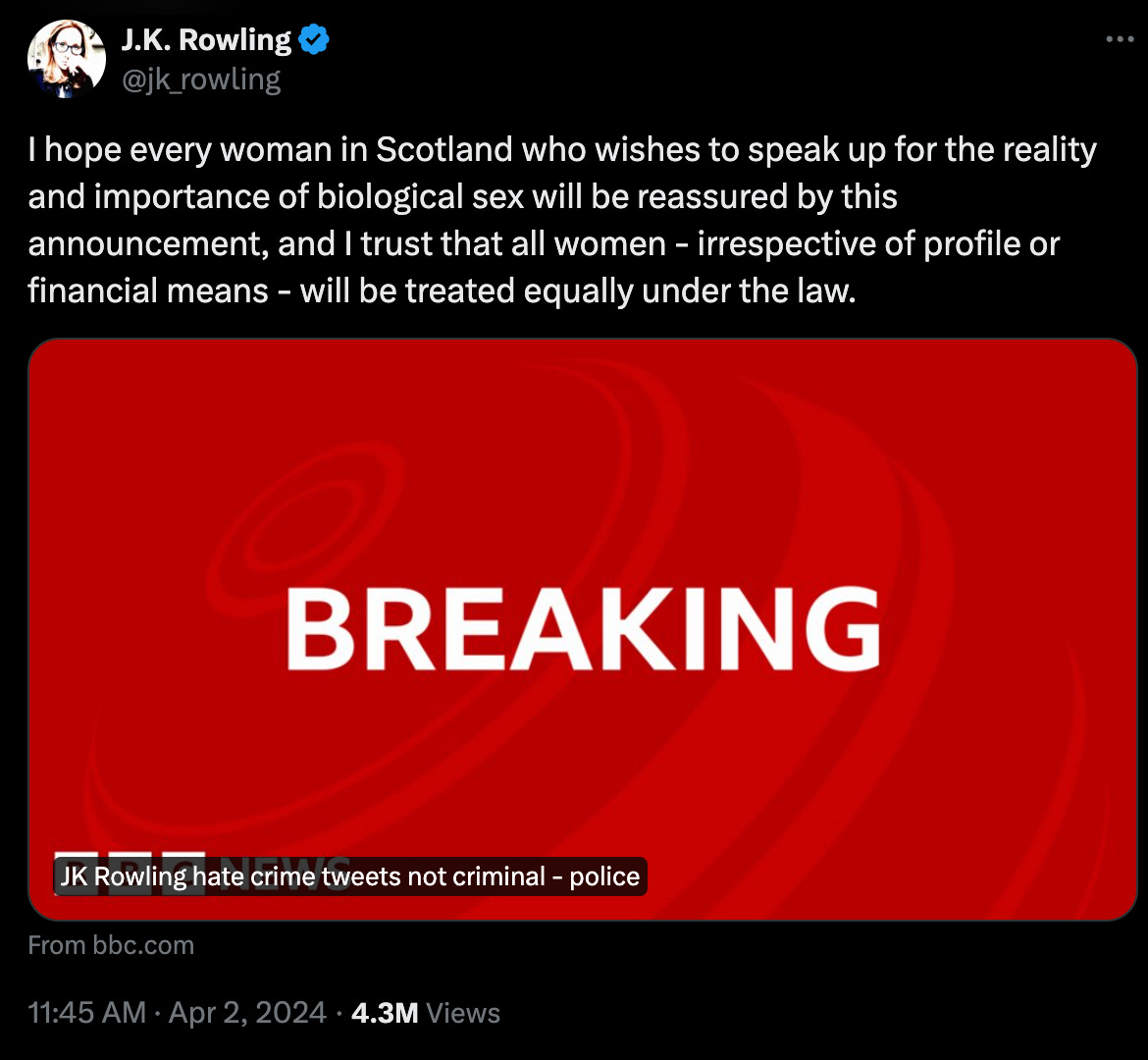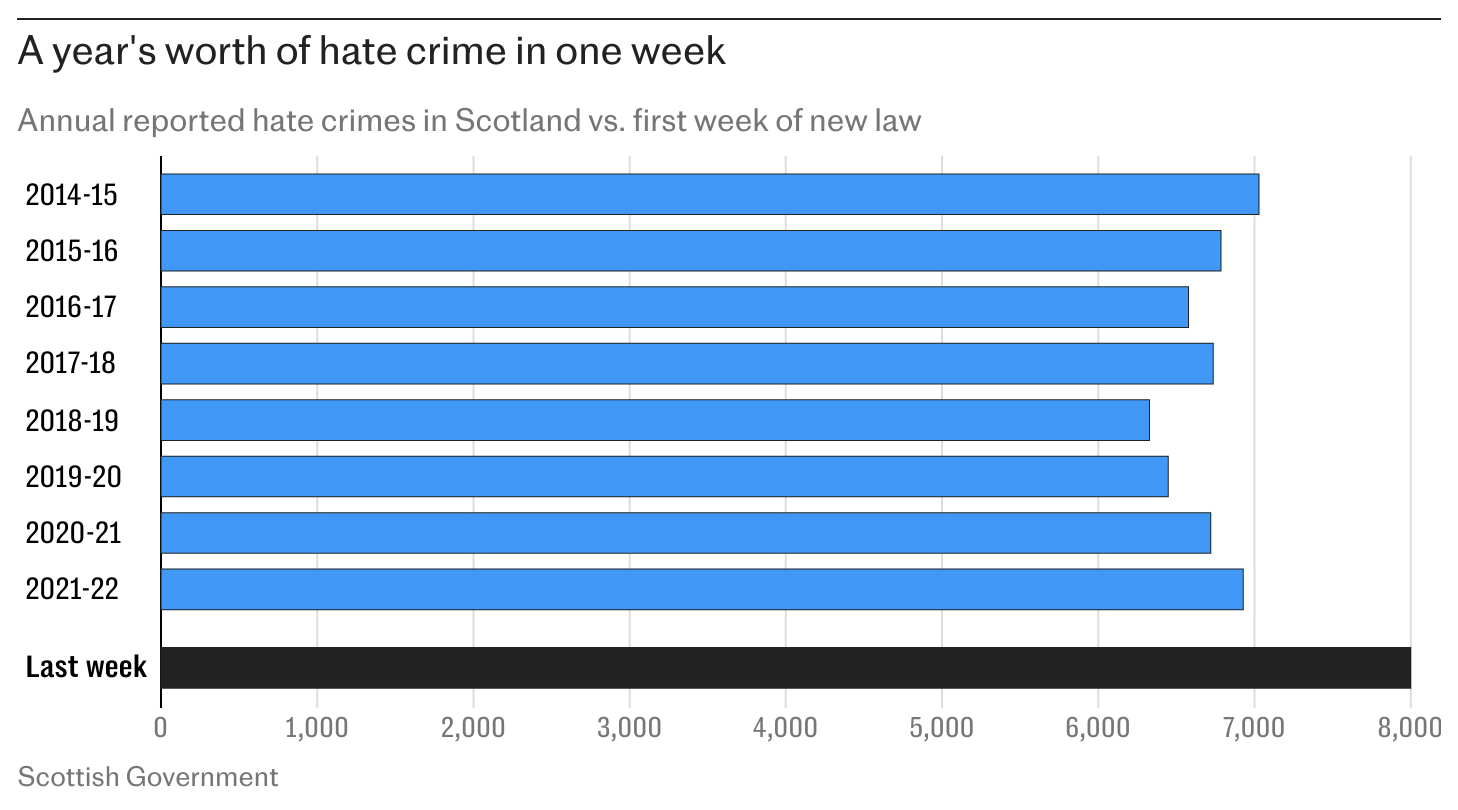Scotland Police ‘Cannot Cope’ As New Hate Crime Law Reports Breaks Yearly Record in One Week
Updated
Government-sanctioned guardrails on what speech is deemed acceptable.
Imprisonment of up to 7 years.
Guilty until you prove yourself innocent.
Home inspections by authorities if wrong speech is being committed under one’s own roof.
No, this isn’t a lost chapter in Orwell’s 1984 nor is it legislation passed by some historical authoritarian regime we were taught never to repeat.
These are directives now falling under official Scotland police business thanks to Scotland’s new Hate Crime and Public Order Law now active.
The law states that a person commits the offense of ‘stirring up hate’ if the person behaves in a manner or communicates to another person material that is considered to be threatening, abusive, or insulting.
The protected characteristics outlined in the bill are “age, disability, religion or, in the case of a social or cultural group, perceived religious affiliation, sexual orientation, transgender identity, variations in sex characteristics.”
Women are not offered protections in Scotland’s new law.
We’ve seen the nebulous word ‘hate’ be used as the newest battering ram in government efforts to control speech. A slew of laws have been rapidly put forth in Canada, Ireland, the UK, Poland (in the works) and other countries to quell debate and conversation over some of the most hot-button topics of our time.
The clear result governments are hoping for in writing such aggressive and heavy-handed language is a chilling effect. Such laws act as beachheads to expand a list of ‘hate’ to future conversations and narratives the government thinks are a problem.
50% of Scotland’s newly protected characteristics revolve around sex. Most notably, ‘transgender identity,’ a highly controversial area where much is not settled or readily accepted.
Rather than allow robust debate, conversation, investigation, and reporting to act as a much-needed societal steam valve on this charged topic, governments are quick to artificially put a lid on the boiling container to assure division and conflict.
Despite where someone stands on these hot-button issues, in Scotland, the government (police) now gets to decide whose speech is prosecutable. These are powers governments and police forces should never fully be put into a position to judge for the individual or greater society.
It’s the reason the framers of the Constitution protected speech in the First Amendment.
As soon as Scotland’s law was activated this week, peaceful protests kicked off in the streets. During the run-up to its implementation, those questioning the authenticity of the bill said it would be weaponized to punish detractors who believe and speak up for the importance of, for example, biological sex. About 8,000 hate crime reports were made in the first week of the legislation coming into force, overtaking the total of 6,927 hate crimes in the entire year of 2020-21 reports the Telegraph.
“Police Scotland have gone public and said that on every occasion, reports of hate crime will be investigated,” said David Threadgold, chairman of the Scottish Police Federation.“That creates a situation where we simply cannot cope at the moment. Officers have been brought back in to do overtime shifts and the management of that is simply unsustainable.”
JK Rowling, author of the Harry Potter series, dared the Scotland police to arrest her for basically calling a man a man on social media – deemed ‘hate crime tweets.’ After dismissing the case, Rowling posted:

Looking at the bigger picture, it’s clear why governments are, in unison, taking this approach. In decades past, major societal transformations, protected narratives, and agendas could be controlled because legacy media enjoyed information control. Those days are over.
During the COVID response, nearly all U.S. agencies up to the White House, were sending regular emails and even spreadsheets, to social media companies to tell them who to censor. That effort became a national embarrassment when both the Twitter files and then the Missouri v. Biden (now Missouri v. Murthy) court case exposed and blocked further government-directed censorship.
With previous censorship efforts on legal pause, a solution had to be found, and fast. Bills in the works, often for several years, are coming to the forefront as the public plays whack-a-mole to combat their implementation legally and through the public discourse.
As such laws work their way through Europe and Canada, we must prepare for a version of them to hit the shores of America.
Beyond the sudden appearance of ‘hate’ we are being told by governments working to find a solution to a problem they benefit from creating, it’s the new powers over speech, expression, and debate being given to current and future questionable government regimes. We’ve seen notoriously bad behavior by elected officials over the last 4 years, do we really want to hand them the keys to a historically protected space of speech and debate?








